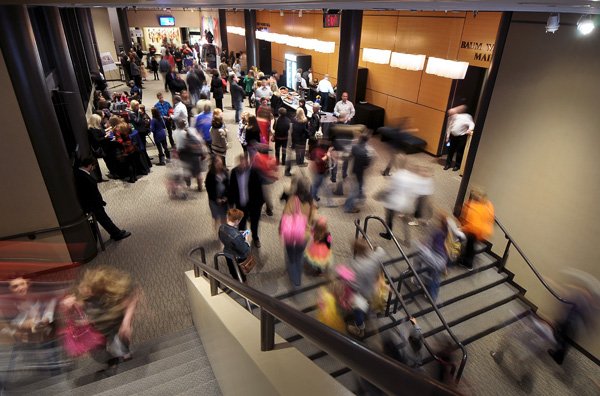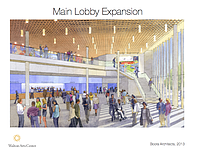FAYETTEVILLE — Voters will decide Nov. 12 whether to commit hotel, motel and restaurant taxes to the Walton Arts Center during the next 25 years.
The money, if approved via a $6.9 million bond issue, will contribute to an estimated $23 million expansion and renovation of the center’s Dickson Street campus. About 30,000 square feet of space will be added.
At a Glance
Special Election
Fayetteville voters will be asked three questions in a Nov. 12 special election. Early voting for the special election begins Tuesday.
• Whether to issue up to $1.5 million in bonds to repay debt associated with Fayetteville Town Center construction.
• Whether to issue up to $3.5 million in bonds to help build and equip a regional park off Cato Springs Road.
• Whether to issue up to $6.9 million in bonds to help renovate the Walton Arts Center on Dickson Street.
Source: Staff Report
Plans include a new lobby, expanded Starr Theater, more backstage space and new administrative offices, along with technical improvements to Baum Walker Hall, which has served as the center’s main performance space since 1991.
Photo Gallery
Walton Arts Center renovations
Renderings of proposed renovations to the Walton Arts Center.
“The arts center in its 22 years has had an enormous impact on this community,” Peter Lane, president and CEO of the center, told attendees at one of two forums last week. “This next iteration of its physical growth will allow us to continue to impact this community in ways we can’t even imagine.”
Amenities Eyed
Arts Center administrators and architects for the project last week detailed reasons they think expansion is needed.
A new lobby would push the center’s main entrance out closer to Dickson Street.
“The lobby just flat out isn’t big enough for people to do what they want to do before and after performances,” said Terri Trotter, chief operating officer.
Restrooms and concession areas would be added to eliminate long lines during intermissions. A new box office is planned on the west side of the building. A revamped reception counter would give patrons a central place to grab tickets before a show, check their coats and have any customer service questions answered. A new stairway also is planned.
The expanded lobby could accommodate social gatherings, corporate events and sit-down dinners for as many as 300 guests. “It will create a brand new event space in the heart of the entertainment district,” Trotter said.
She said there will be some lighting and sound system upgrades in the 1,201-seat Baum Walker Hall. Seating will be added for people with disabilities, and front-row seats in Baum Walker’s balcony will be adjusted to increase leg room.
Planned improvements also include additional backstage space and an expanded Starr Theater. According to Trotter, performances can’t be scheduled in the 165-seat black box theater about 100 days out of the year. When events with large casts and crew are held in Baum Walker Hall, Starr Theater is used as dressing room and storage space.
Additional backstage space will free Starr Theater for more performances, Lane said, making the center a true “functioning two-theater complex.”
Trotter said the goal is to make Starr Theater more of a destination spot for regular jazz nights, theatrical performances from groups such as Trike Theatre, comedy shows or Saturday morning programs for kids.
The theater will get its own entrance and lobby along West Avenue, giving center programmers the ability to schedule multiple performances simultaneously. The larger space will be reconfigured and include 250 retractable seats and could be used for social gatherings. A window will be for events that require natural light.
“The finished level inside will be improved so it doesn’t feel like you’re just going into a black-painted concrete box, which is what it actually is now,” Stephen Weeks with Boora Architects said.
City Parking Deck
Also key to expansion is a 246-space parking deck planned on the southeast side of the campus at School Avenue and Spring Street.
“Our Number 1 concern for a number of years has been our parking experience,” Lane said.
The parking deck isn’t part of the special election. It’s being paid for with $6.2 million in bonds the city issued in December. Parking deck bonds are being paid using fees and fines associated with the city’s paid parking program.
“The plan is to build the parking deck no matter what happens with the bond issue,” David Jurgens, Fayetteville utilities director, said Thursday.
More than $250,000 in paid parking revenue has also gone toward parking services, arts education and subsidized ticket sales at center events the past three years, according to Paul Becker, city finance director.
City Council members, when considering the parking deck, agreed to replace the center’s administrative offices, which are being torn down as part of the project. A shell building for new backstage space on the north end of the parking deck will also be paid for using city bond money, Becker said.
It will be up to center officials to fill in the backstage space. The center is financially responsible for any office space beyond what is there now, square-footage-wise, Becker said. Lane said office expansion is a big reason cost estimates for center improvement increased from $20.6 million initially to roughly $23 million.
Coordinating both construction projects is essential, said Michael Tingley of Boora.
According to a timeline presented Tuesday, lobby construction on the north side of the center will start in June, once parking deck construction on the south side of the property is under way. Work on backstage space and Starr Theater is to begin the following summer and last until May 2016. Jurgens said he expects the parking deck to be finished in 2015.
Trotter and Lane said the center will continue to hold performances during construction, although there may temporary closings in the summer months during heavy demolition.
Early Support
City and University of Arkansas officials agreed in December 1986 after months of negotiation to build the Walton Arts Center at Dickson Street and West Avenue. City taxpayers committed $4.5 million to the project. Some came from sales tax, and some came from hospitality taxes. The university matched the city’s contribution using a gift from Sam and Helen Walton. Of the roughly $9 million, $3 million went toward establishing the center’s endowment.
The $6 million wasn’t enough to purchase the block where the center sits and build the 52,000-square-foot building. A group led by Helen Walton and Billie Jo Starr solicited millions of dollars from individuals and businesses across Northwest Arkansas to fill the gap. Total construction cost more than $10 million.
Starr said last week some of the amenities early planners wanted to include, such as a larger lobby, had to be cut.
“A lot of the things being put in now are things we wanted to do then but didn’t have money for,” Starr said Joe Fennel, who opened Jose’s Mexican Restaurant and Cantina in 1980, said the center’s construction transformed Dickson Street and continues to bring visitors to Fayetteville.
Fennel, who also owns Bordinos and serves as president of the revived Dickson Street Merchants Association, said the group of 16 entertainment district business owners is endorsing passage of the bond election, and the Walton Arts Center ballot question in particular.
“The best thing people can do is come park their car early and spend food dollars and liquor dollars,” Fennel said. “That’s a tremendous asset for us.”
Fennel said an announcement earlier this year the Arkansas Music Pavilion will move to Rogers and the Walton Arts Center Council’s 2010 decision to build a 2,000-seat center in Bentonville has done little to change his opinion.
“Nobody in Fayetteville’s written them a check for a $100 million,” Fennel said. “It still doesn’t change what we need to do with the facility that’s sat on Dickson Street for the past 20 years. That facility needs a major upgrade in order for us to be competitive.”
Starr called a vote for the bond issue a vote for Fayetteville. “It’s an opportunity to put your name out there and say, ‘I believe in this city,’” she said.
A group associated with Fayetteville’s Chamber of Commerce also is rallying support for all three bond proposals. No organized opposition has come forward.
A successful bond election will not create a new tax. A yes vote won’t increase the city’s 2 percent tax on hotel stays and restaurant food purchases, and a no vote won’t do away with the tax.
Dollars, Cents
It’s unclear if center improvements will go forward without an infusion of tax money.
“The bond is a critical part of this project,” Trotter said.
Administrators anticipate roughly one-third of the $23 million expansion project will come from public sources, which, along with the proposed $6.9 million bond issue, include a $600,000 contribution from Advertising and Promotion Commission reserve. One-third is expected from individual and corporate giving, and one-third is expected from foundation support.
Trotter and Lane wouldn’t say how much money has been raised for the project. Center administrators don’t publicly disclose private donations.
Bill Mitchell, the center’s former executive director who was hired to develop a fundraising strategy for the project, said a capital campaign is in its early stages.
Mitchell, who runs a management consulting and planning firm, said it’s not unusual for public sources to provide the first influx of cash for major capital campaigns. Mitchell said large donors “absolutely” want to see buy-in from the public before they commit to a certain level of spending.
The bond money, if approved, must be used exclusively for expansion and renovation. It cannot support programming or go to general operation, including personnel costs.
The center board approved a roughly $11 million budget for 2014 to operate the center and the pavilion. The budget includes expenses of about $3.5 million for personnel.
Money for the arts is one of several allowable uses of Advertising and Promotion Commission money, according to state law. Hospitality tax dollars can be used to construct, maintain or operate convention centers, public recreation and “tourist-oriented” facilities and parking lots.
If all three ballot questions are approved, annual payments on bonds for the center, a regional park and retiring Town Center debt will be $675,000, said Marilyn Heifner, executive director of the Advertising and Promotion Commission. That’s nearly the same amount that went toward paying Town Center debt last year. Heifner said it’s yet to be determined how the money would be used if one or all of the ballot measures fail.


